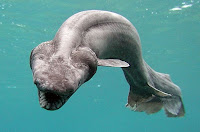The Blobfish or the Blob Sculpin

The Blobfish or Blob Sculpin Not many of us will ever set our eyes on this rather lazy, slow moving creature: the Blobfish, also known as the Australian Sculpin or Toadfish - scientific name: Psychrolutes marcidus . Except in pictures. Because they live in oceans, deep underwater. The problem is that the blobfish lives at depths of 600 to 1,200m (1,970-3,940 ft). Instead of using a swim bladder to maintain buoyancy, he has gelatinous flesh that is slightly less dense than water, allowing him to float just above the sea floor. It probably doesn't look so bad down there, but up here he looks a little melty and... splat.. Mainly off the cost of Australia and Tasmania. For most of us: few creatures come as ugly as the blobfish. Most likely, the few fishermen who get to catch them in their nests while fishing must think they must have caught some alien. But: stop hating the Toadfish. It is a product of its environment; it is due to its brilliant adaptation allowing this fish to be...
